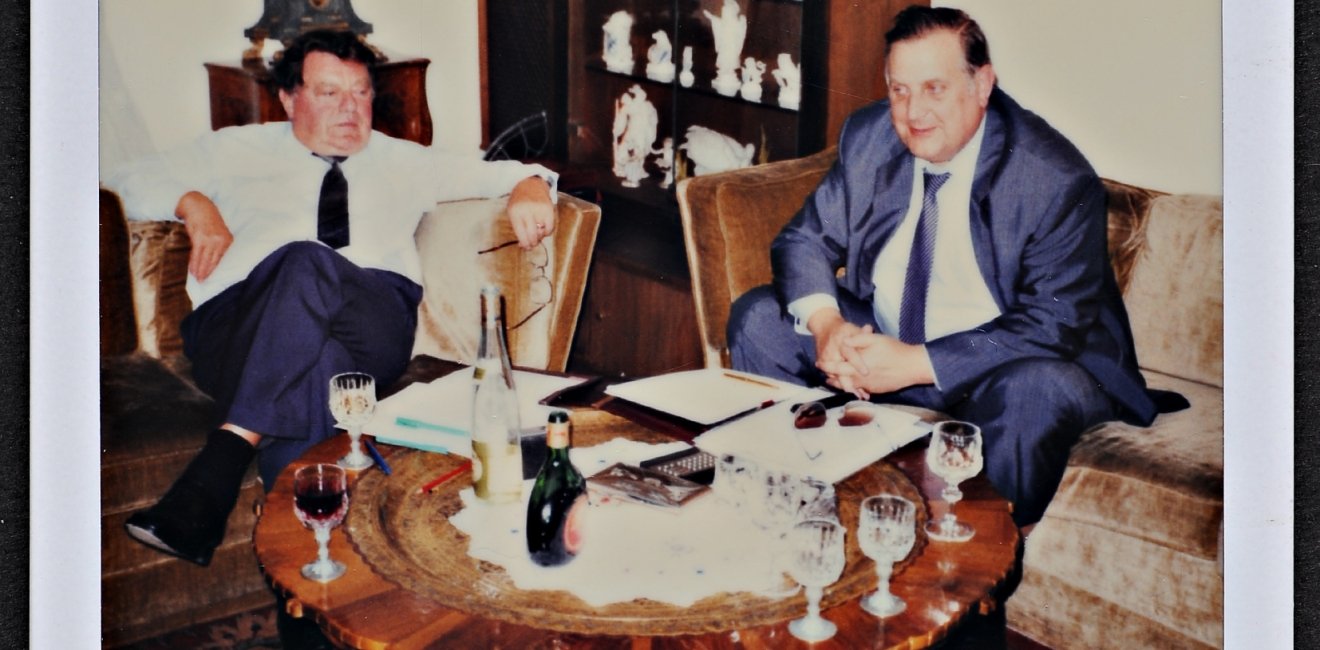Alexander Schalck-Golodkowski was one of the pivotal political figures in Communist East Germany, the former German Democratic Republic (GDR). Erich Honecker’s negotiator in a variety of important talks with the Federal Republic of Germany, Schalck served as Undersecretary of State in the GDR’s Ministry of Foreign Trade. In addition, he was head of the GDR’s Kommerzielle Koordinierung (Koko), a secret commercial enterprise whose main goal was to bring foreign currency to the GDR. Schalck was also a meticulous record collector and kept verbatim transcripts of his one-on-one backchannel meetings with key West German policymakers such as Bavaria’s Prime Minister Franz Josef Strauß and Wolfgang Schäuble, Helmut Kohl’s Chancellery Minister. Schalck’s penchant for note-taking and his unique position as backchannel negotiator for the GDR make his papers at the Bundesarchiv Berlin Lichterfelde are a treasure trove (Bestand DL 226, Ministerium für Außenhandel der DDR, Kommerzielle Koordinierung).
Schalck was well versed in politics, had held several positions, and had good personal ties to the leaders of all branches of the communist party, but it was Günter Mittag’s protection that was likely the most decisive factor in Schalck’s rising influence. It goes without saying that party leader Erich Honecker was in charge of relations with the Federal Republic, but Mittag was the “second man in charge of the GDR’s Deutschlandpolitik”.[1] Mittag was a permanent member of the Politburo and the Head of the Central Committee’s Economic Division. When Honecker installed a permanent Politburo working group for the conduct of relations with the Federal Republic in 1976, Mittag was appointed its head, and Schalck became its secretary. The purpose of the so-called “Arbeitsgruppe BRD/Westberlin” was to elaborate on concepts and papers in order to help the Politburo apparatus make decisions. Thus, aside from his initial job as the GDR’s hard currency fundraiser, Schalck turned into a pivotal player in terms of Deutschlandpolitik. He established a special division within KoKo to help him conduct negotiations with representatives from the Federal Republic.
In 1983 and 1984, Erich Honecker and Günter Mittag assigned Schalck the task of pursuing top-secret backchannel negotiations with Bavaria’s leader Franz Josef Strauß to obtain two, billion-Deutschmarks loans from the West German government. In July 2018, the Strauß-Schalck conversation will be published in an edited volume by the Federal German Archives.[2] It was a highlight in Schalck’s government career. During these two years, there were 13 personal meetings between Strauß and Schalck. In addition, they exchanged hundreds of backchannel messages to keep each other informed and to push things forward.
The loans signaled continuity in Ostpolitik and inner-German trade against the background of the Euromissile Crisis and the deployment of Intermediate-Range Nuclear Forces in Western Europe in 1983. In the short run, the billion Deutschmarks stabilized the communist regime in East Germany and the credit saved it from insolvency. At the same time, however, the Kohl-Genscher administration utilized the loan as a long-term investment to buy the freer movement of people, information, and ideas. The deal was “freer movement in return for cash”.[3]
Schalck’s backchannel with Strauß strengthened his power position. His reports went straight to Mittag and Honecker – the Politburo was not involved. He was a congenial negotiating partner for Strauß. It seemed that the atmosphere of conspiracy drove Strauß to harsh criticism of the Kohl government. Schalck was keen to include Strauß’s statements in his verbatim records of their meetings. According to Schalck, Strauß described Kohl’s Chancellery as “badly organized chaos”, and criticized Kohl’s indecisiveness: "If you try to nail Kohl to a decision, he slides away like pudding."[4]
The billion DM loan of July 1983 (“Milliardenkredit”) was an advance payment. The East German leadership showed no signs of repaying the advance until September 1983, when the minimum exchange requirement for children and adult visitors under the age of 15 was abolished. Soon after, the GDR authorities began to dismantle the automatic shooting devices along the inner-German border. Though these initial moves fell short of the response public opinion in West Germany had hoped for, the rapprochement continued. Granting the Milliardenkredit made an agreement on environmental questions possible. In November 1983, both sides managed to conclude a new postal arrangement improving the flow of communication between both Germanys.
The link between the money and the improvement in societal contacts was obvious. But there was no contract that stipulated freer movement in return for cash. There were assurances and non-papers, but there was no formal linkage. The GDR rejected a binding commitment and a deadline to fulfill its part of the deal. Erich Honecker needed the money, but he was eager to claim, vis-à-vis the Soviet leadership, that the deal did not impair the GDR’s sovereignty. The advance payment required trust in the reliability of the GDR. And the backchannel between Strauß and Schalck was essential to building that confidence.
Indeed, Strauß and Schalck came to trust each other. There was mutual affection and respect. They had a steady level of personal communication that went beyond the mere exchange of facts and information. At first glance, it seems an unlikely partnership: Strauß, the Bavarian leader, and Schalck, the Undersecretary of State in the GDR’s Ministry of Foreign Trade and the big-shot state security officer. But both shared the conviction that it was imperative to keep the inner-German détente alive and to protect the network of inner-German ties from international crisis and the global Cold War.
Schalck’s papers highlight the intricate balance between East Germany’s desire for ideological demarcation and the regime’s growing need for credits, and economic cooperation with West Germany. Schalck’s records shed new light on the emergence of cooperative security policies between the two Germanys, detailing the move from “traditional” security policy strategies based on coercion and confrontation toward a strategy seeking solutions for security problems through cooperation, even with potential enemies. Trade and finance had the unique power to overcome boundaries between East and West. The economic dimension of détente was a major, yet hidden factor for East Germany’s transformation and its gradual ideological integration into Western Europe.
Last, but not least, Schalck’s records also contain plenty of evidence of the Soviet Union’s reactions towards the inner-German rapprochement. In 1984, for instance, the Soviet leadership attacked Honecker for his close relations with the Kohl administration. He was accused of selling out socialism in the GDR in return for economic assistance. The Soviet leadership would not tolerate further political concessions for money. Nevertheless, the economic interdependence between the two Germanies was there to stay eventually becoming a major factor in the demise of the entire Warsaw Pact, and at its heart: Alexander Schalck-Golodkowski.
[1] Alexander Schalck-Golodkowski, Deutsch-deutsche Erinnerungen, Hamburg: Rowohlt Verlag, 2000, 278.
[2] See Dokumente zur Deutschlandpolitik, Series VII, Vol. 1, 1 October 1982–31 December 1984, Munich: De Gruyter, 2018.
[3] See Stephan Kieninger, "Freer Movement in Return for Cash. Franz Josef Strauß, Alexander Schalck-Golodkowski, and the Milliardenkredite for the GDR, 1983–1984", in: Bernhard Blumenau, Jussi M. Hanhimäki, Barbara Zanchetta (Eds), London: Routledge, 2018, 117–137.
[4] Memorandum of Conversation between Alexander Schalck Golodkowski and Franz Josef Strauß, 9 December 1983, in: BArch, DL 226/1189, 406–416, here 408–409.







